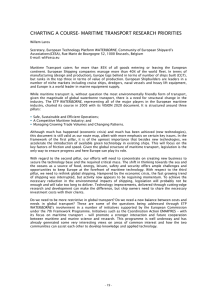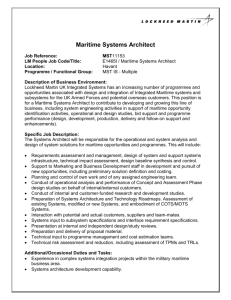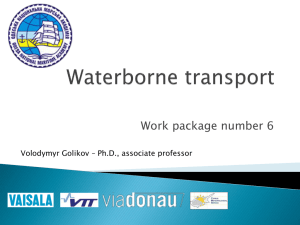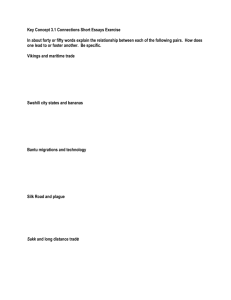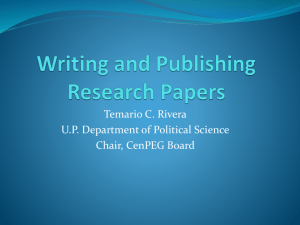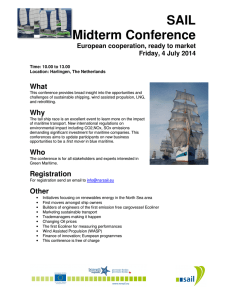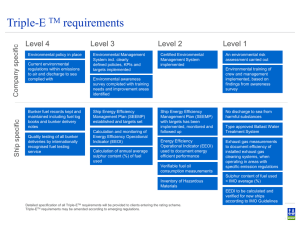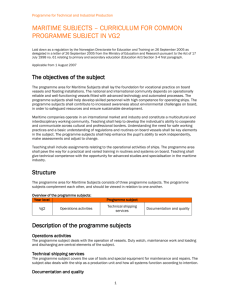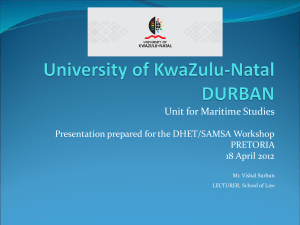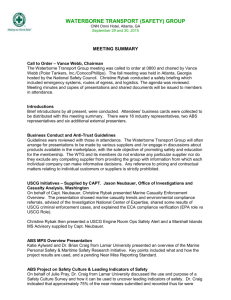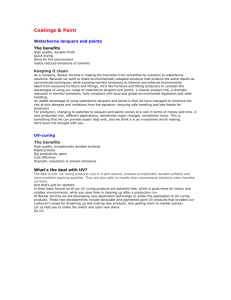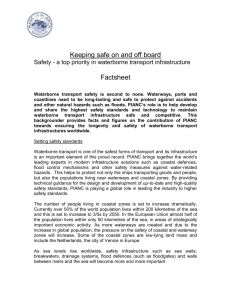Third Research Maritime Conference Brussels, 16 June 2015
advertisement
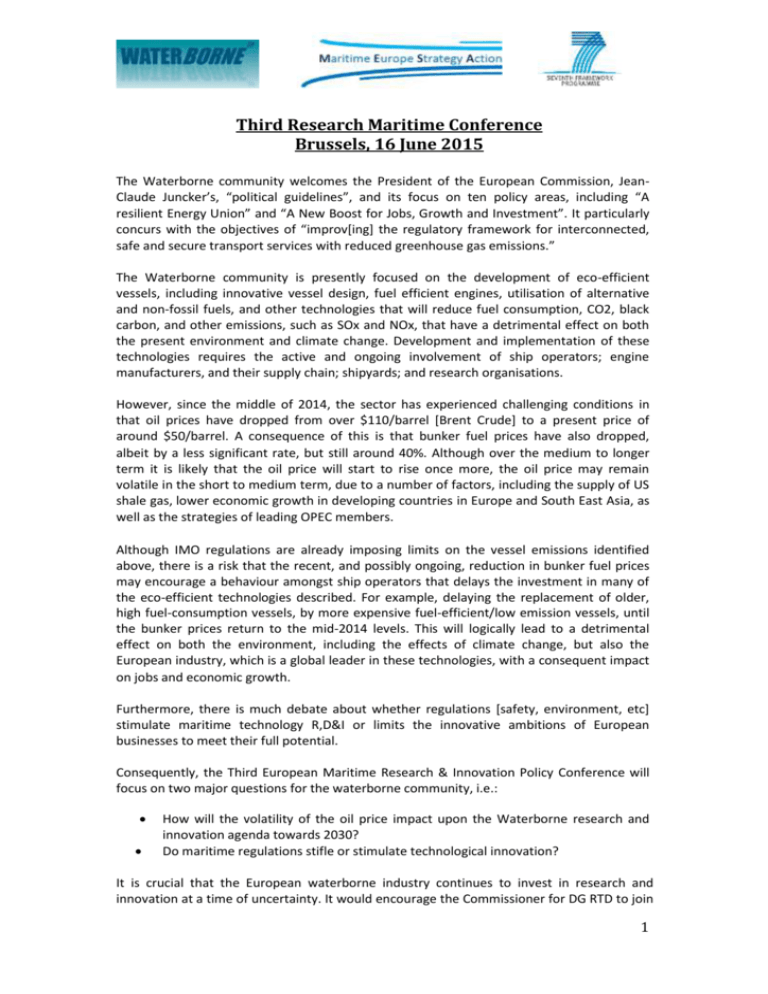
Third Research Maritime Conference Brussels, 16 June 2015 The Waterborne community welcomes the President of the European Commission, JeanClaude Juncker’s, “political guidelines”, and its focus on ten policy areas, including “A resilient Energy Union” and “A New Boost for Jobs, Growth and Investment”. It particularly concurs with the objectives of “improv[ing] the regulatory framework for interconnected, safe and secure transport services with reduced greenhouse gas emissions.” The Waterborne community is presently focused on the development of eco-efficient vessels, including innovative vessel design, fuel efficient engines, utilisation of alternative and non-fossil fuels, and other technologies that will reduce fuel consumption, CO2, black carbon, and other emissions, such as SOx and NOx, that have a detrimental effect on both the present environment and climate change. Development and implementation of these technologies requires the active and ongoing involvement of ship operators; engine manufacturers, and their supply chain; shipyards; and research organisations. However, since the middle of 2014, the sector has experienced challenging conditions in that oil prices have dropped from over $110/barrel [Brent Crude] to a present price of around $50/barrel. A consequence of this is that bunker fuel prices have also dropped, albeit by a less significant rate, but still around 40%. Although over the medium to longer term it is likely that the oil price will start to rise once more, the oil price may remain volatile in the short to medium term, due to a number of factors, including the supply of US shale gas, lower economic growth in developing countries in Europe and South East Asia, as well as the strategies of leading OPEC members. Although IMO regulations are already imposing limits on the vessel emissions identified above, there is a risk that the recent, and possibly ongoing, reduction in bunker fuel prices may encourage a behaviour amongst ship operators that delays the investment in many of the eco-efficient technologies described. For example, delaying the replacement of older, high fuel-consumption vessels, by more expensive fuel-efficient/low emission vessels, until the bunker prices return to the mid-2014 levels. This will logically lead to a detrimental effect on both the environment, including the effects of climate change, but also the European industry, which is a global leader in these technologies, with a consequent impact on jobs and economic growth. Furthermore, there is much debate about whether regulations [safety, environment, etc] stimulate maritime technology R,D&I or limits the innovative ambitions of European businesses to meet their full potential. Consequently, the Third European Maritime Research & Innovation Policy Conference will focus on two major questions for the waterborne community, i.e.: How will the volatility of the oil price impact upon the Waterborne research and innovation agenda towards 2030? Do maritime regulations stifle or stimulate technological innovation? It is crucial that the European waterborne industry continues to invest in research and innovation at a time of uncertainty. It would encourage the Commissioner for DG RTD to join 1 the Third European Maritime Research & Innovation Policy Conference to steer the discussions in a positive direction for European policy recommendations in support of ecoinnovation and efficient regulation, in the light of the challenges we face today. For Whom: The conference aims to attract policy makers; maritime stakeholders; research community and academia to discuss the developments and future maritime RDI against the backdrop of current issues impacting the sector at large. Draft Agenda: 10:00 – 10:10: Welcome Willem Laros (Damen), Chairman of Waterborne TP 10:10 – 10:30: Keynote Rudolf Strohmeir, Deputy Director General, DG Research and Innovation (tbc) o The importance of Maritime Research & Innovation for jobs and growth in Europe 10:30 – 11.00: Setting the Scene Douwe Cunningham, Secretary General, SEA Europe o What are the drivers of Maritime Research & Innovation? [focus on energy efficiency, regulations, etc] 11:00 – 11:30: Coffee/Networking 11:30 – 13:00: Session 1: How will the volatility of the oil price impact upon the Waterborne research and innovation agenda towards 2030? Moderator: Douwe Cunningham, SEA Europe Speakers: John Westwood, Chairman, Douglas Westwood o Projected oil price [factors: global economic growth/demand - OPEC impact of shale gas, etc.] o Impact on bunker/marine fuel prices Shipowner o Impact on ship/equipment purchase/decommissioning o Response to regulations on emissions/energy efficiency o Impact on ship operations Oskar Levander, Vice President Innovation, Engineering and Technology, Rolls Royce o Anticipating change 2 Henk Prins, Manager Research & Development, Marin Panel Discussion & Q&A 13:00 – 14:00: Lunch 14:00 – 15:30 Session 2: Do regulations stifle or stimulate technological innovation? Moderator: Philippe Corrignan, Head of Safety, Energy, Environment and Research Section, Marine & Offshore Services Department, Bureau Veritas Speakers Christine Berg, Head of Unit Maritime Safety, DG Move o A view Paris Sansoglou, Secretary General, European Dredging Association o A view Massimo de Benedetti , Director of Research and Innovation, Fincantieri o A view Fernando Caldeira-Saraiva, Research Director, BMT o A view Panel Discussion & Q&A 15:30 – 16:00: Coffee/Networking 16:00 – 17:00: Summing Up Panel Discussion & Q&A o o o o DG RTD Willem Laros, Waterborne TP Chairman Douwe Cunningham, SEA Europe Phillipe Corrignan, BV 17:00: Cocktail & Networking 3
